unit9
- 格式:doc
- 大小:80.00 KB
- 文档页数:16
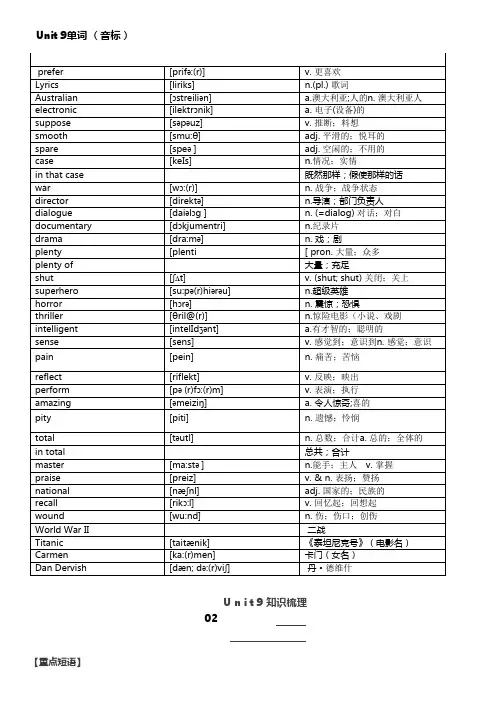
Unit 9单词(音标)U n i t 9 知识梳理02【重点短语】1.dance to (music) 随着(音乐)跳舞2.sing along with 随着…一起唱3.musicians who play different kinds of music弹奏不同类型音乐的音乐家4.electronic music 电子音乐5.not much 没什么(事)6.suppose sb to do sth. 猜想某人做某事7.be supposed to do sth 应该做某事8.suppose sb (to be) +adj. 原以为…9.have spare time 有空闲时间10.in one’s spare time在某人的空闲时间11.spare the time to do sth 抽时间做…12.a film director 一名电影导演13.think too much 想太多14.in that case 既然那样15.World War II 第二次世界大战16.smooth music 悦耳的音乐17.prefer A to B 比起B来更喜欢A18.prefer doing A to doing B19.prefer to do sth. rather than do sth.20.feel like doing sth 想要做某事21.stick to 坚持,固守22.be down 悲哀,沮丧23.cheer sb up 使… 高兴/ 振奋24.have a happy ending 有个美满的结局25.try one’s best to do sth. 尽某人最大努力做…26.less serious 不那么严重27.a good way to do sth 做某事的好办法28.make me feel even sadder 让我感觉更伤心29.provide plenty of information about a certain subject 提供了大量的关于某个主题的信息30.shut off my brain 关闭我的大脑【重点句型】1.I love singers who write their own music.我喜欢自己创作曲子的歌手。
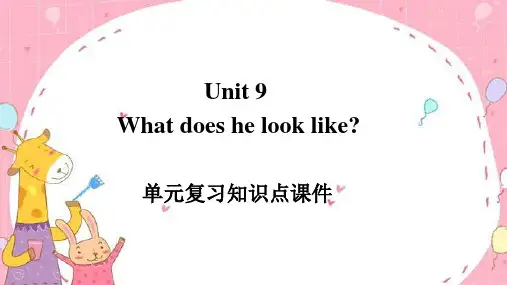
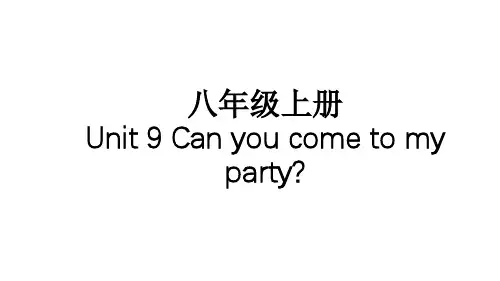

Unit 9I like music that I can dance to.Section A (1a-2d)1.重点单词:prefer,lyrics,Australian,electronic,suppose,smooth,spare,case,director,war2.重点短语:sing along with,dance to,different kinds of,in that case3.重点句式:—What kind of music do you like?—I like music that I can sing along with.Carmen likes musicians who play different kinds of music.I prefer movies that give me something to think about.1.重点短语和句型2.定语从句定语从句一、预习课本P65-66新单词并背诵,完成下面的汉译英。
1.更喜欢________ 2.歌词________3.电子的________ 4.推想________5.平滑的________ 6.空闲________7.情况________ 8.导演________9.战争________ 10.澳大利亚的________二、认真预习1a-2d找出下列短语和句型。
1.随之唱歌________________________________________________________ ________________2.随着……跳舞________________________________________________________ ________________3.不同种类的________________________________________________________ ________________4.既然那样________________________________________________________ ________________5.—你喜欢什么种类的音乐?—我喜欢能跟着唱的音乐。
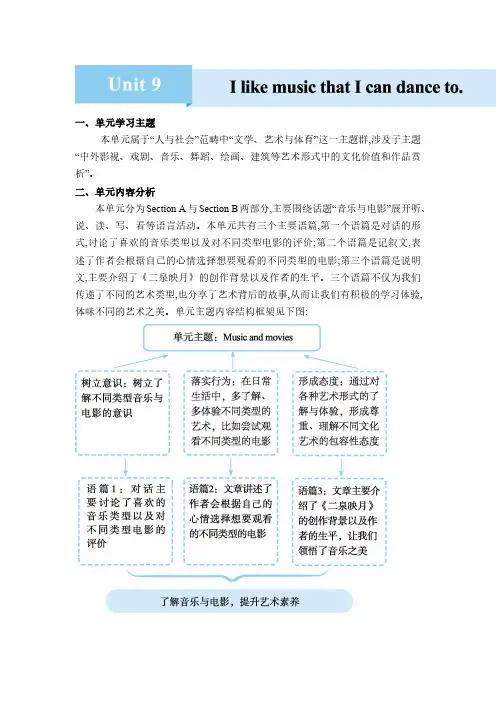
一、单元学习主题
本单元属于“人与社会”范畴中“文学、艺术与体育”这一主题群,涉及子主题“中外影视、戏剧、音乐、舞蹈、绘画、建筑等艺术形式中的文化价值和作品赏析”。
二、单元内容分析
本单元分为Section A与Section B两部分,主要围绕话题“音乐与电影”展开听、说、读、写、看等语言活动。
本单元共有三个主要语篇,第一个语篇是对话的形式,讨论了喜欢的音乐类型以及对不同类型电影的评价;第二个语篇是记叙文,表述了作者会根据自己的心情选择想要观看的不同类型的电影;第三个语篇是说明文,主要介绍了《二泉映月》的创作背景以及作者的生平。
三个语篇不仅为我们传递了不同的艺术类型,也分享了艺术背后的故事,从而让我们有积极的学习体验,体味不同的艺术之美。
单元主题内容结构框架见下图:。
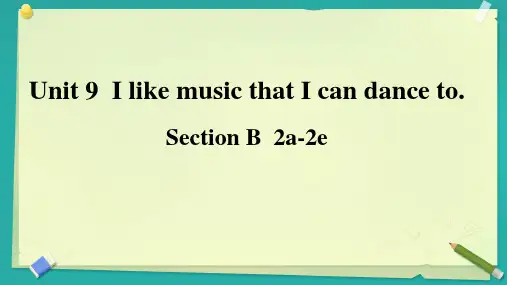
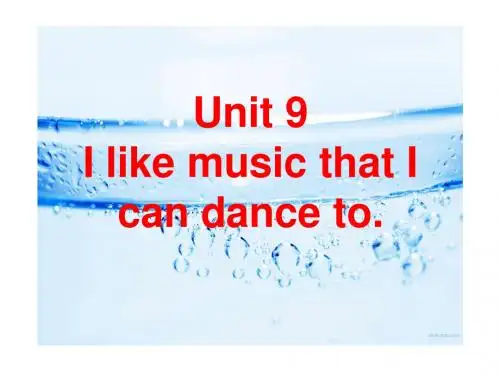
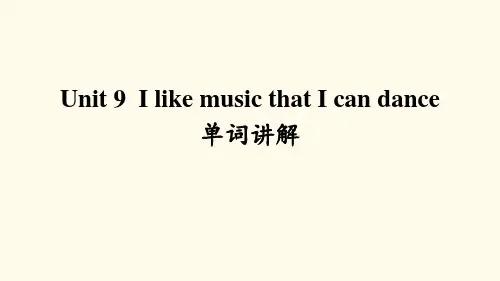
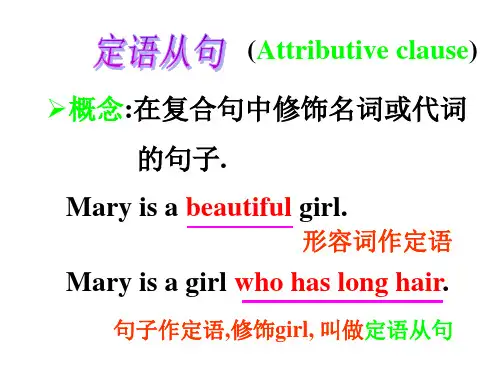
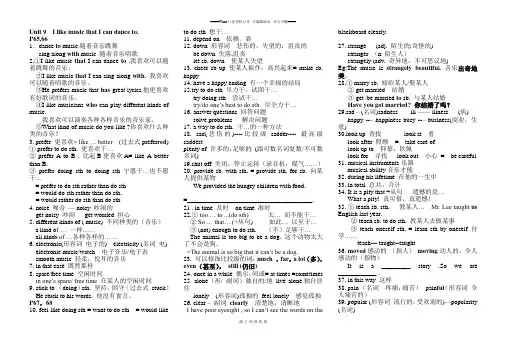
Unit 9 I like music that I can dance to.P65,661.dance to music随着音乐跳舞sing along with music 随着音乐唱歌2.①I like music that I can dance to .我喜欢可以随着跳舞的音乐。
②I like music that I can sing along with. 我喜欢可以随着唱歌的音乐。
③He prefers music that has great lyrics.他更喜欢有好歌词的音乐。
④I like musicians who can play different kinds of music.我喜欢可以演奏各种各样音乐的音乐家。
⑤What kind of music do you like ?你喜欢什么种类的音乐?3. prefer 更喜欢= like … better (过去式prefer red)① prefer to do sth. 更喜欢干…②prefer A to B . 比起B更喜欢A= like A better than B.③prefer doing sth to doing sth 宁愿干…也不愿干…= prefer to do sth rather than do sth= would do sth rather than do sth.= would rather do sth than do sth4. noise 噪音— noisy 吵闹的get noisy 吵闹get worried 担心5. different kind s of ( music) 不同种类的(音乐)a kind o f … 一种……all kind s of …各种各样的……6. electronic(形容词电子的) electricity (名词电) electronic music/watch 电子音乐/电子表smooth music 轻柔,悦耳的音乐7. in that case 既然那样8. spare/free time 空闲时间in one’s spare/ free time 在某人的空闲时间9. stick to (doing)sth. 坚持,固守(过去式stuck)He stuck to his words. 他没有食言。

Unit 9知识点讲解1. dance to music 随着音乐起舞2. sing along with 随着……一起唱3. musicians who play different kinds of music弹奏不同类型音乐的音乐家4. electronic music 电子音乐5. not much=nothing much 没什么(事)6. suppose . to do sth. 猜想某人做某事be supposed to do sth. 应该做某事suppose (to be) +adj. 原以为……7. have spare time 有空闲时间in one's spare time 在某人的空闲时间spare the time to do sth. 抽时间做……8. think too much 想得太多;过度思考9 in that case 既然那样10. World War II 第二次世界大战11. smooth music 悦耳的音乐12. prefer A to B 比起B来更喜欢Aprefer doing A to doing B愿意去做A而不是去做Bprefer to do A rather than do B宁愿做A而不做B13. feel like doing sth. 想要做某事=want to do sth. =would like to do sth.14. stick to 坚持,固守15. be down 悲哀,沮丧16. cheer up 使… 高兴/ 振奋17. have a happy ending 有个美满的结局18. less serious 不那么严重19. a good way to do sth. 做某事的好办法20. shut off 关闭21. in time 及时on time 按时/准时22. once in a while 偶尔的;有时=sometimes /at times23. write one's own lyrics 自己写歌词24. take to sp. 带某人去某地25. Chinese folk music 中国民间音乐26. be played on the erhu 由二胡演奏的27. move . 感动某人(. be moved by sth.)28.strangely beautiful 异常的/出奇的美29. sense a strong sadness and pain感觉到一种强烈的伤感和痛苦30. the most moving pieces of music最令人感动的乐曲31. the city of Shantou = Shantou city 汕头市32. by age 17 到十七岁的时候33. musical ability 音乐才能34. develop a serious illness 得了一种很重的病35. become blind 成了盲人;变瞎36. make money 赚钱37. get married (to .) (和某人)结婚38. continue to do sth. 继续去做某事(另一件事)continue doing sth. 继续做着某事(同一件事)39. perform in this way 用这种形式表演40. during/ in one's lifetime 在某人有生之年41. by the end of ... 到……末为止(时间)at the end of ... 在……尽头/末梢(时间、地点)42. It's a pity that ... 遗憾的是……43. in total 总共44. be recorded for the future world to hear被记录下来供后人聆听45. praise ... for ... 因为……赞美46. China's national treasures 中国的国家珍宝47. paint a picture of ... 描绘了一幅……画48. recall one's deepest wounds唤起某人最深的伤痛49. painful experiences 痛苦的经历50. a time for spreading joy 传播快乐的时间知识点梳理1. Hmm, depends which movie. 嗯,那要看是哪部电影了。
Unit 9 I like music that I can dance to.【教材原句】I like music that I can dance to.我喜欢我可以跳舞的音乐。
【句型剖析】I like music that I can dance to.为含有定语从句的复合句,that I can dance to为定语从句,修饰先行词music,that为关系代词,在定语从句中作主语。
【拓展】在复合句中,修饰某一名词或代词的从句叫做定语从句。
被定语从句修饰的词叫做先行词。
定语从句必须放在先行词之后。
引导定语从句的关联词有关系代词that,who,which等和关系副词when,where,why等,且定语从句的关联词在从句中充当一定的成分,从句中谓语动词的时态及单复数要和它所修饰的先行词保持一致。
This is the present that he gave me for my birthday.这是他给我的生日礼物。
Do you know everybody who came to the party?你认识来宴会的每一位吗?I still remember the night when I first came to the village.我仍旧记得第一次来到那个村庄的晚上。
This is the place where Chairman Mao once lived.这是毛主席曾经居住过的地方。
【经典练】—Have you ever seen the film The Wandering Earth ?—Yes, It’s the best one _______ I have ever seen.A.which B.what C.it D.that【写作佳句】Last term, I bought a magazine that I had always wanted.考点2.prefer的用法【教材原句】I prefer music that has great lyrics. 我更喜欢歌词优美的音乐。
1.更喜欢prefer 过去式preferred2.歌词pl. lyrics3.澳大利亚Australia 澳大利亚人Australian4.电electricity 带电的electric电子的electronic5.推断suppose6.悦耳的平滑的smooth7.空闲的抽出spare8.导演director v.指导adj.直接的direct adj.间接的indirect 直接地directly9.情况实情case10.战争war11.粘贴将...刺入stick 过去式stuck12.悲哀沮丧down 同义词sad /upset13.对话对白dialogue14.结尾结局ending15.纪录片documentary pl.documentaries16.戏,剧drama17.关闭shut 过去式shut18.超级英雄superhero pl. superheroes19.有才智的intelligent20.感觉到意识到sense21.悲伤悲痛sadness adj.sad22.痛苦疼痛pain adj. painful23.反映reflect24.动人的moving adj.moved25.表演执行performn. performer表演者n.performance 表演26.一生lifetime27.遗憾怜悯pity28.总数总的total29.大师能手master30.表扬赞扬praise31.伤伤口wound adj. Wounded 1.既然那样in that case2.坚持固守stick to3.大量众多plenty of4.偶尔地间或once in a while5.总共in total6.跟着..一起唱sing along with7.有空闲时间have spare time8.喜欢严肃的电影like serious movies9.二战the World Wall II10.取决于depend on11.有开心的结局have a happy ending12.使我感到更悲伤make me feel even sadder13.关闭shut off14.提供大量信息provide plenty of information15.就某一个话题about a certain subject16.为...所打动be moved by17.感受到强烈的悲伤和伤痛sense a strong sadness and pain18.最令人感动的乐曲之一one of the most moving pieces of music19.到他17岁时by the age of 1720.因他的音乐天赋而出名be known for his musical ability21.用这种方式in this way22.继续做某事continue to do / doing sth23.在他一生中during his lifetime24.中国国粹之一one of China’s national treasures25.极其优美be strangely beautiful26.到...末为止by the end of...27.600多首曲子over 600 pieces of music28.描绘...的画面paint a picture of...29.使人们回忆起悲伤痛苦经历中最深的伤痛make people recall their deepest wounds from their own sad or painful experiences.30.过艰苦的生活live a hard lifeI like music that I can sing along with.2.他更喜欢演奏柔和舒缓的音乐的组合。
九年级英语unit9知识点总结英语是一门重要的语言,我们在学习过程中必须掌握各种知识点。
在九年级英语的学习中,Unit 9是一个重要的单元,本文将对这个单元的知识点进行总结。
1. 单词和短语这个单元中有许多重要的单词和短语,比如interview(采访),apply(申请),volunteer(志愿者),workshop(研讨会)等。
我们需要记住这些词汇的意思和用法,并学会正确地运用到对话和写作中。
2. 句型和语法在Unit 9中,我们学习了一些重要的句型和语法知识,比如宾语从句和否定副词的用法。
宾语从句在复合句中起到连接主句和从句的作用,我们要学会识别和运用宾语从句。
否定副词可以改变整个句子的意思,我们需要了解不同的否定副词的用法和规则。
3. 阅读理解Unit 9中有一些阅读材料,我们需要学会提取关键信息,理解文章的主旨和细节。
同时,我们也要锻炼自己的阅读理解能力,学会推理和推断,从文章中推测出作者的意图和态度。
4. 写作技巧写作是英语学习中的重要部分,Unit 9中我们学习了一些写作技巧。
比如,在求职信中我们要介绍自己的个人信息和优势,同时表达对该职位的兴趣和适应能力。
我们要学会运用恰当的语言和词汇来写作,并注意书写的格式和结构。
5. 听力技巧听力是英语学习的难点之一,Unit 9中我们要学会听懂一些面试和求职的对话。
我们可以通过多听一些实际对话,了解常用的表达方式和说话习惯。
同时,我们也要积极参与听力练习,提高自己的听力能力。
6. 课外拓展在学习Unit 9的过程中,我们还可以进行一些拓展。
比如,阅读相关的英语材料,了解不同国家和地区的求职和面试文化差异。
我们也可以参加一些模拟面试和写作比赛,提高自己的实际应用能力。
总之,九年级英语Unit 9的学习内容涵盖了单词和短语、句型和语法、阅读理解、写作技巧、听力技巧等方面。
我们要全面掌握这些知识点,通过反复练习和实践,提高自己的英语能力。
希望本文的总结对大家有所帮助。
人教版九年级英语unit9知识点人教版九年级英语unit9知识1知识梳理【重点】danceto(music)随着(音乐)跳舞singalongwith随着…一起唱musicianswhoplaydifferentkindsofmusic弹奏不同类型音乐的音乐家electronicmusic电子音乐notmuch没什么(事)supposesbtodosth.猜想某人做某事besupposedtodosth应该做某事supposesb(tobe)+adj.原以为…havesparetime有空闲时间inone’ssparetime在某人的空闲时间sparethetimetodosth抽时间做…afilmdirector一名电影导演thinktoomuch想太多inthatcase既然那样WorldWarII第二次世界大战smoothmusic悦耳的音乐preferAtoB比起B来更喜欢ApreferdoingAtodoingBprefertodosth.ratherthandosth.20.feellikedoingsth想要做某事stickto坚持,固守bedown悲哀,沮丧cheersbup使…高兴/振奋haveahappyending有个美满的结局tryone’sbesttodosth.尽某人最大努力做…lessserious不那么严重agoodwaytodosth做某事的好办法makemefeelevensadder让我感觉更伤心provideplentyofinformationaboutacertainsubject提供了大量的关于某个主题的信息shutoffmybrain关闭我的大脑【重点句型】1.Ilovesingerswhowritetheirownmusic.我喜欢自己创作曲子的歌手。
Weprefermusicthathasgreatlyrics.我们更喜欢歌词很棒的曲子。
WhatdoyoudislikeaboutthisCD.你不喜欢这张CD的什么?Whatdoesitremindyouof?它使你想起了什么?ThemusicremindsmeofBraziliandancemusic.这首曲子使我想起了巴西舞曲。
Text A learned words and popular words本课主要单词1.learned adj. 有学问的,博学的;学术上的这个单词做形容词用时有两种读音,一是,另一个是或 .读时,意思是“有学问的,博学的;学术上的”;读或时,意思是“经过训练学到的”。
a learned man (学者) a learned discussion (学术讨论)a learned doctor (医道高明的医生) a learned journal (学术刊物)a learned response 后天的反应(指非天生的)He was learned in the ways of the words. (他深通人情世故。
)2.cultivated adj. 耕种的;栽培的;有修养的cultivate v. 耕种;种植;培养;陶冶;建立;教化cultivation n 耕种;栽培;培养;修养。
1)The farmer was busy cultivating the land when I found him. (我找到那位农民时,他正忙着耕地。
)2)His father cultivated a farm of 80 acres. (他父亲耕种一个80英亩地的农场。
)3)Extensive reading can cultivate your mind. (广泛阅读能陶冶你的心性。
)4)He tried hard to cultivate good relations with his colleagues. (他努力与同事们建立良好关系。
)5)He is a very cultivated young man. (他是一个非常有教养的年轻人。
)6)Her cultivated voice was pleasing to the audience. (她文雅的说话嗓音很悦耳。
)7)He just can't understand why they allowed the land to go out of cultivation.(他就是不理解他们为什么任土地荒芜。
)8)The cultivation of good manners will be very helpful to his future.(礼貌习惯的养成对他的未来将有很大的帮助。
)9)He is a man of charm and cultivation. (他既有魅力又有教养。
)3.concern n. 关心;关系;关联 v.涉及,有关于;使关心,使挂念1)This matter is no concern of yours. (这件事跟你毫无关系。
)2)I don't think it is my concern, go and ask the manager, please. (这事跟我没关系,请去问经理。
)3)We felt concern for (或over) your health. (我们为你的健康担心。
)4)He is said to have been concerned in the crime. (据说他与这起犯罪事件有关。
)5)The energy problem concerns us all. (能源问题关系到我们每个人。
)6)The baby's poor health concerned his parents. (孩子身体不好使父母担忧。
)concern oneself in sth…… 关心concern oneself with (about, over, in)忙于concern oneself about (for)担忧have no concern with 与…无关to whom it may concern (用作正式信件的开头)敬启者concerned adj. 担忧的,不安的;有关联的;关心的1)We are concerned about (at, over) world peace. (我们关心世界和平。
)2)He spoke to the people concerned. (他对有关的人讲了话。
)3)We are not concerned with who is right or wrong. (我们对谁是谁非不感兴趣。
)4)As far as ability is concerned, he is the best candidate. (就能力而言,他是最佳人选。
)concerning prep. 关于1)This is a proposal concerning child health. (这是一项关于儿童健康的建议。
)2)Please inform me concerning this matter. (请把关于这件事的情况告诉我。
)4.possession n. 所有,拥有possess v. 拥有;具有;掌握;耐住(性子)1)The possession of a degree does not guarantee you a job. (有学位不一定保证能找到工作。
)2)When his father died, he came into possession of a large ranch. (他父亲去世后,他继承了一个大牧场。
)3)He was a poor man with few possessions. (他是个没有什么财产的穷人。
)4)The old house is now in his possession. (这所老房子现在归他所有。
)5)The old lady is in possession of some gold coins. (那位老太太拥有一些金币。
)6)How much money does he possess?(他有多少钱?)7) He told us that he possessed a little French. (他对我们说他懂一点法语。
)8) He possessed his temper despite the insult. (尽管受到了侮辱,他还是按捺住怒气。
)5.occasion n. 时刻;场合;时机occasional adj. 偶尔的,偶然的occasionally adv. 偶然地1)We've met each other on more than one occasion. (我们已经不止一次地见过。
)2)He wanted to give people a good impression on this special occasion.(他想在这个特别的场合给人们留下好印象。
)3)The weather was good except for an occasional shower. (除了偶尔有阵雨外,天气很好。
)4)They go into town occasionally. (他们偶尔进城。
)6.acquaintance n. 相识;了解;熟人acquaint v. 使认识;了解1)I had some acquaintance with this subject. (对这一课题我曾有所了解。
)2)He has many acquaintances. (他交游甚广。
)3)It's necessary to acquaint Western readers with recent happenings in China.(向西方读者介绍中国最近的动态很有必要。
)4)She decided to acquaint herself with every aspect of the question.(她决定使自己对这个问题的每一个方面都了如指掌。
)5)We were acquainted with each year several years ago. (我们几年前就相互认识了。
)7.formal adj. 正式的;形式的;礼仪上的informal adj. 非正式的;不拘礼节的formally adv. 正式地1)They wrote a formal letter of thanks. (他们写了一封正式的感谢信。
)2)He received formal training in music when he was only 6.(他六岁时就接受了正规的音乐训练。
)3)It's not appropriate to wear informal clothes on formal occasions. (在正式场合穿便装不合适。
)4)Discussions were formally opened in David Camp last week. (讨论上周在戴维营正式开始。
)8.elevated adj. 提高的;高贵的,庄严的elevate v. 提高;提升elevation n. 高度;提升;崇高elevator n. 起重工人;电梯1)She considers herself too elevated to eat in a fast-food restaurant. (她自视过高,不愿在快餐店用餐。
)2)He spoke in an elevated tone. (他用庄严的语气讲着。
)3)He was elevated to a higher rank. (他晋了级。
)4)They worked hard to elevate the living standards. (他们努力工作以提高生活水平。
)5)He was overjoyed at his elevation to the position of general manager. (他因晋升为总经理而欣喜万分。
)6)They are flying at an elevation of 8000 feet. (他们正在8000英尺高空飞行。
)7)You can take an elevator to the 18th floor. (你可以乘电梯去十八楼。
)9.style n. 风格;文体;式样1)They sell hats in all sizes and styles. (他们出售各种式样和尺寸的帽子。
)2)He changed his style of painting when he returned from Paris. (他从巴黎回来后就改变了画风。
)3)Sincerity and simplicity are his style. (真挚和简练是他的文体。